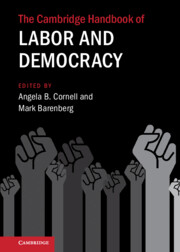Book contents
- The Cambridge Handbook of Labor and Democracy
- The Cambridge Handbook of Labor and Democracy
- Copyright page
- Contents
- Contributors
- Acknowledgments
- Introduction
- Part I Labor and Democracy: Theory and Practice
- 1 A New Labor Law for Deep Democracy
- 2 Labor and Democracy
- 3 Labor’s Obstacles and Democracy’s Demise
- 4 Right-Wing Populism, Illiberal Democracy, Trade Unions, and Workers’ Rights
- Part II History, Politics, and Law
- Part III Labor, Diversity, and Democracy
- Part IV Country and Regional Perspectives
- Part V Labor and Democracy Sectoral Case Studies: Platform Workers, Higher Education, and the Care Industry
- Index
- References
1 - A New Labor Law for Deep Democracy
From Social Democracy to Democratic Socialism
from Part I - Labor and Democracy: Theory and Practice
Published online by Cambridge University Press: 25 January 2022
- The Cambridge Handbook of Labor and Democracy
- The Cambridge Handbook of Labor and Democracy
- Copyright page
- Contents
- Contributors
- Acknowledgments
- Introduction
- Part I Labor and Democracy: Theory and Practice
- 1 A New Labor Law for Deep Democracy
- 2 Labor and Democracy
- 3 Labor’s Obstacles and Democracy’s Demise
- 4 Right-Wing Populism, Illiberal Democracy, Trade Unions, and Workers’ Rights
- Part II History, Politics, and Law
- Part III Labor, Diversity, and Democracy
- Part IV Country and Regional Perspectives
- Part V Labor and Democracy Sectoral Case Studies: Platform Workers, Higher Education, and the Care Industry
- Index
- References
Summary
Conventional workplace law includes the law of collective bargaining and employment contracts. This chapter argues that, to fully understand how law constructs worker power, industrial democracy, and political democracy, workplace law should greatly broaden in scope. The “new labor law” should encompass components of many fields of law that influence worker power and democracy as much as many components of conventional labor law. These additional components are lodged in domestic and international finance law, social wage law, constitutional law, communication law, tax law, and many more fields. The chapter applies the new labor law to critique and offer proposals to reconstruct existing law in the service of empowering workers in the workplace and polity, within both capitalist economies and imagined democratic socialist regimes.
Keywords
- Type
- Chapter
- Information
- The Cambridge Handbook of Labor and Democracy , pp. 13 - 35Publisher: Cambridge University PressPrint publication year: 2022

